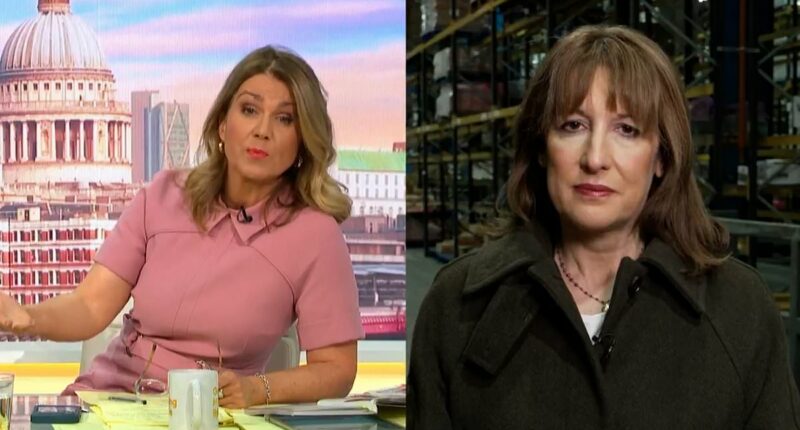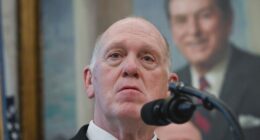Share this @internewscast.com
Susanna Reid put Rachel Reeves on the spot this morning, questioning her about potentially breaking Labour’s manifesto promises in the recent Budget announcement.
The Good Morning Britain host challenged the Chancellor in a tense interview on the ITV breakfast show, following the reveal of a £30 billion initiative impacting British workers.
Rachel Reeves introduced a range of minor tax hikes in an effort to stabilize finances, having recently scrapped plans for a significant income tax increase that would have contradicted the manifesto.
The proposals include a pay-per-mile tax for electric vehicles, higher taxes on online gambling, and a ‘mansion tax’ targeting properties valued over £2 million.
Despite these measures, Reeves faced criticism for allegedly violating Labour’s campaign pledge to avoid raising taxes on ‘working people,’ notably due to a £13 billion income tax freeze set to last three years.
In a heated discussion with Reid, the Labour MP firmly denied any breach of the manifesto, clarifying that the commitment was specifically about not altering tax ‘rates.’
But the presenter refused to let the floundering Chancellor off the hook, asking her: ‘How can anyone believe anything you say?’
‘I am Chancellor in the world as it is and not in the world as I might like it to be,’ Ms Reeves replied, before repeating the ways in which the Government was easing costs on taxpayers.

Susanna Reid (left) had Rachel Reeves (right) looking flustered this morning after grilling her about whether she broke Labour’s manifesto commitments in the Budget

In an interview on Good Morning Britain, the Chancellor wriggled on whether the package broke Labour ‘s manifesto, claiming that document only committed to not changing tax ‘rates’
The Chancellor continued: ‘I am not pretending what I did yesterday is not asking working people to contribute more, but because of other changes we have made around gambling taxes, around higher value properties, means that I was able to keep that to an absolute minimum.
Ms Reid then responds saying: ‘But you acknowledge that when you make a promise, when you make in a promise in the manifesto, when you make a promise in the Commons publicly, we can’t believe those promises because they could be broken.’
The Chancellor squirms once more as she reiterates: ‘In the manifesto it is very clear that it was rates of income tax, National Insurance and VAT.’
But, an unrelenting Ms Reid cut her off and insisted she was lying: ‘That’s not true. In the manifesto it said and I quote “Labour will not increase taxes on working people”. ‘
Ms Reeves then jumped in to defend herself, saying: ‘But Susanna if you then carry on reading the next sentence says the rates. But I do recognise that we have asked from 2028 for people to contribute more by freezing those thresholds for further three years.’
While Ms Reeves has tried to justify the move with the introduction of smaller tax reliefs and money off energy bills, members of the public fear they will struggle to make ends meet.
‘Middle aged single parent. Worked hard, earn higher rate tax salary. Never benefitted from child benefit due to salary. Striving to pay into pension to secure a good retirement. now paying for other people’s children, NI benefits removed from my pension – where is the help?,’ one person wrote on X.
Another added: ‘Well all I heard was stutters and stumbling, I’m a single father and yesterday’s budget to me has made it harder to spend time with my son as I have to work longer to keep the lights on at home, this budget to me myself feels it’s like I have a bully stood on my neck taking money.’
Others praised Reid for her staunch interviewing technique, with one person writing: ‘Thank you @susannareid100 for saying what the majority of the country are thinking and would like to say to the chancellor!
The huge raid unveiled yesterday includes an eye-watering £12.7billion from extending the hated tax threshold freeze for another three years.
Around a quarter of the working population will be paying higher or top rate tax by then, up from just 15 per cent when it was imposed in 2021.
The higher rate threshold would have been £70,370 by 2030 instead of £50,270 if it had risen in line with inflation.
The tax burden is due to reach a new peak as a proportion of GDP in records that go back more than 300 years.
The Office for Budget Responsibility said economic growth under Labour would be even lower than forecast last year – and warned that none of the 88 measures unveiled by Ms Reeves would have a ‘material impact’ on boosting GDP.
The decision to spend £3billion a year axing the two-child cap was cheered wildly by Labour MPs.
But it will involve the taxpayer funding handouts worth thousands of pounds a year each to Britain’s biggest jobless families.
The OBR on Wednesday night warned that the largesse would result in a further 25,000 big families claiming benefits, at an estimated cost of £300million.

Ms Reeves is seen in the Commons as she unveiled a series of smaller money grabbing tax increases in a desperate bid to balance the books
Overall welfare spending is forecast to be £16billion higher by 2030-31 than the watchdog thought as recently as March.
Alarmingly, annual spending on welfare per year is forecast to rise from £333billion in 2025-26 to £389.4billion in 2029-30.
The Tories condemned it as a ‘Budget for benefits street’ while Nigel Farage hit out at an ‘assault on aspiration’.
However, the measures have been welcomed by Labour MPs with ministers suggesting Ms Reeves has ‘saved her skin’.
In a round of interviews this morning, the Chancellor told GB News: ‘I did have to increase taxes yesterday, but I’ve kept them to an absolute minimum on ordinary working people, freezing those thresholds for an additional three years from 2028.’
Ms Reeves added: ‘This Government are backing aspiration.’
The Chancellor told Sky News that Labour was ‘very specific in the manifesto that we wouldn’t increase the rates of income tax, national insurance or VAT’.
She added: ‘But I do recognise yesterday that I have asked working people to contribute a bit more by freezing those thresholds from 2028.
















